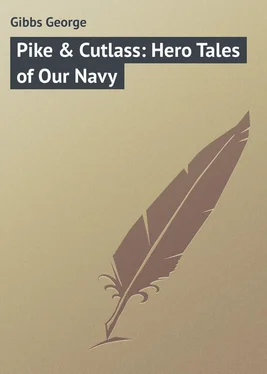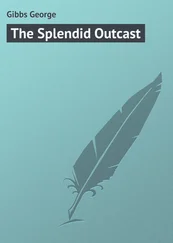George Gibbs - Pike & Cutlass - Hero Tales of Our Navy
Здесь есть возможность читать онлайн «George Gibbs - Pike & Cutlass - Hero Tales of Our Navy» — ознакомительный отрывок электронной книги совершенно бесплатно, а после прочтения отрывка купить полную версию. В некоторых случаях можно слушать аудио, скачать через торрент в формате fb2 и присутствует краткое содержание. ISBN: , Жанр: foreign_prose, на английском языке. Описание произведения, (предисловие) а так же отзывы посетителей доступны на портале библиотеки ЛибКат.
- Название:Pike & Cutlass: Hero Tales of Our Navy
- Автор:
- Жанр:
- Год:неизвестен
- ISBN:http://www.gutenberg.org/ebooks/42138
- Рейтинг книги:3 / 5. Голосов: 1
-
Избранное:Добавить в избранное
- Отзывы:
-
Ваша оценка:
- 60
- 1
- 2
- 3
- 4
- 5
Pike & Cutlass: Hero Tales of Our Navy: краткое содержание, описание и аннотация
Предлагаем к чтению аннотацию, описание, краткое содержание или предисловие (зависит от того, что написал сам автор книги «Pike & Cutlass: Hero Tales of Our Navy»). Если вы не нашли необходимую информацию о книге — напишите в комментариях, мы постараемся отыскать её.
Pike & Cutlass: Hero Tales of Our Navy — читать онлайн ознакомительный отрывок
Ниже представлен текст книги, разбитый по страницам. Система сохранения места последней прочитанной страницы, позволяет с удобством читать онлайн бесплатно книгу «Pike & Cutlass: Hero Tales of Our Navy», без необходимости каждый раз заново искать на чём Вы остановились. Поставьте закладку, и сможете в любой момент перейти на страницу, на которой закончили чтение.
Интервал:
Закладка:
So swift was the work that in ten minutes no Tripolitans were left on the deck of the frigate but the dead. Not a sailor had been killed. One man had been slashed across the forehead, but he grinned through the blood and fought the more fiercely. Then the watchers out on the “Siren” saw a single rocket go high in the air, which was Decatur’s signal that the “Philadelphia” was again an American vessel.
In the meanwhile the combustibles were handed up from the ketch with incredible swiftness, and the work of destruction began. Midshipman Morris and his crew had fought their way below to the cock-pit and had set a fire there. But so swiftly did those above accomplish their work that he and his men barely had time to escape. On reaching the upper deck, Decatur found the flames pouring from the port-holes on both sides and flaring up red and hungry to seize the tar-soaked shrouds. He gave the order to abandon, and over the sides they tumbled as quickly as they had come. Decatur was the last to leave the deck. All the men were over, and the ketch was drifting clear, while around him the flames were pouring, their hot breath overpowering him. But he made a jump for it and landed safely, amid the cheers of his men.
Then the great oars were got out, eight on a side, and pulling them as only American sailor-men could or can, they swept out towards the “Siren.”
The Tripolitans ashore and on the gunboats had hastened to their guns, and now, as the ketch was plainly seen, their batteries belched forth a terrific storm of shot that flew across the water. The men bent their backs splendidly to their work, jeering the while at the enemy as the balls whistled by their heads or sent the foam splashing over them. Out they went across the great crimson glare of the fire. It was magnificent. The flames swept up the shrouds with a roar, catching the woodwork of the tops and eating them as though they were tinder. She was ablaze from water to truck, and all the heavens were alight, – aglow at the splendid sacrifice. Then to the added roar of the batteries ashore came the response from the guns of the flaming ship, which, heated by the fierce flames, began to discharge themselves. But not all of them were fired so, for in a second all eyes were dazzled by a blazing light, and they saw the great hull suddenly burst open, with huge streaks of flame spurting from between the parting timbers. Then came a roar that made the earth and sea shudder. The fire had reached the magazine.
The waves of it came out to the gallant crew, who, pausing in their work, gave one last proof of their contempt of danger. Rising to their feet, they gave three great American cheers that echoed back to the forts while their guns thundered fruitlessly on.
Decatur and his men were safe under the “Siren’s” guns.
Is it any wonder that Congress gave Decatur a sword and made him a captain, or that Lord Nelson called this feat “the most daring act of any age”?
THE BIGGEST LITTLE FIGHT IN NAVAL HISTORY
It should have been renown enough for one man to have performed what Nelson was pleased to call “the most daring act of any age.” But the capture of the “Philadelphia” only whetted Decatur’s appetite for further encounters. He was impetuous, bold even to rashness, and so dashing that to his men he was irresistible. But behind it all – a thing rare in a man of his peculiar calibre – there was the ability to consider judiciously and to plan carefully as well as daringly to execute. His fierce temper led him into many difficulties, but there was no cruelty behind it; and the men who served with him, while they feared him, would have followed him into the jaws of death, for they loved him as they loved no other officer in the American service. Once while the frigate “Essex,” Captain Bainbridge, lay in the harbor at Barcelona, the officers of the American vessel suffered many petty indignities at the instance of the officers of the Spanish guardship. Having himself been subjected to a slight from the Spanish commander, Lieutenant Decatur took the bull by the horns. He bade his coxswain pull to the gangway of the Spaniard, and he went boldly aboard. His lips were set, for he had resolved upon his own responsibility to make an immediate precedent which would serve for all time. The Spanish commander, most fortunately, was absent. But Decatur none the less strode aft past the sentry to the gangway and, lifting his great voice so that it resounded from truck to keelson, he shouted, —
“Tell your comandante that Lieutenant Stephen Decatur, of the ‘Essex,’ declares him to be a scoundrelly coward, and if Lieutenant Decatur meets him ashore he will cut his ears off.”
So among the men of the squadron Decatur came to be known as a man who brooked nothing and dared everything.
But when the crusty Preble took command in the Mediterranean he was not over-impressed with the under-officers of his command. Not one of the lieutenants was over twenty-four and none of those higher in authority had turned thirty. Decatur and Somers were twenty-five; Charles Stewart was only twenty-six, and Bainbridge the younger; Morris and Macdonough were barely out of their teens.
It was not the custom of the commander-in-chief to mince his words. So sparing himself the delicacy of secluding himself behind the saving bulkheads of the after-cabin he swore right roundly at his home government for sending him what he was pleased to call “a parcel of d – school-boys.” He was a martinet of the old style, and believed in the school of the fo’c’s’le, and not in young gentlemen whose friends at home sent them in by the ports of the after-cabin. He held the youngsters aloof, and not until he had tried them in every conceivable fashion would he consider them in his councils. A year had passed, and Decatur, Morris, Bainbridge, Macdonough, and Somers had helped to add glorious pages to naval history, before the old man, with a smile to Colonel Lear, the consul, consented to say, —
“Well, after all, colonel, they are very good school-boys!”
Although Decatur’s success in the destruction of the “Philadelphia” had removed a dangerous auxiliary battery from the harbor of Tripoli, the bashaw was far from overawed, and, with the officers and crew of the “Philadelphia” as hostages, declined to consider any terms offered by the Americans; and so it was resolved by Commodore Preble to make an attempt upon the Tripolitan batteries and fleet. The Americans had the “Constitution,” – “Old Ironsides,” – Commodore Preble, and six brigs and schooners mounting twelve and sixteen guns each. Preble had also succeeded in borrowing from “the most gracious king of the Sicilies,” who was then at war with the bashaw, two bomb-vessels and six single gunboats, – quite a formidable little force of a hundred and thirty-four guns and about a thousand men.
It was not until the morning of the 3d of August, 1804, that the weather, which had been very stormy, moderated sufficiently to allow the squadron to approach the African coast. The gunboats were unwieldy craft, flat-bottomed, and, as the sea made clean breeches over them, they were a dozen times in danger of sinking. But by ten o’clock the sky to the southward had lightened, and the heavy storm-clouds were blowing away overhead to the westward. “Old Ironsides” shook the reefs out of her topsails and, spreading her top-gallant-sails, she beat up for the entrance of the harbor of Tripoli with two of the gunboats in tow. Her tall spars, seeming almost to pierce the low-rolling clouds, towered far above the little sticks of the “Siren” and “Nautilus,” which bore down directly in her wake. The sea had lashed out its fury, and, before the little fleet had reached the reef, the gray had turned to green, and here and there a line of amber showed where the mid-day sun was stealing through.
Читать дальшеИнтервал:
Закладка:
Похожие книги на «Pike & Cutlass: Hero Tales of Our Navy»
Представляем Вашему вниманию похожие книги на «Pike & Cutlass: Hero Tales of Our Navy» списком для выбора. Мы отобрали схожую по названию и смыслу литературу в надежде предоставить читателям больше вариантов отыскать новые, интересные, ещё непрочитанные произведения.
Обсуждение, отзывы о книге «Pike & Cutlass: Hero Tales of Our Navy» и просто собственные мнения читателей. Оставьте ваши комментарии, напишите, что Вы думаете о произведении, его смысле или главных героях. Укажите что конкретно понравилось, а что нет, и почему Вы так считаете.












